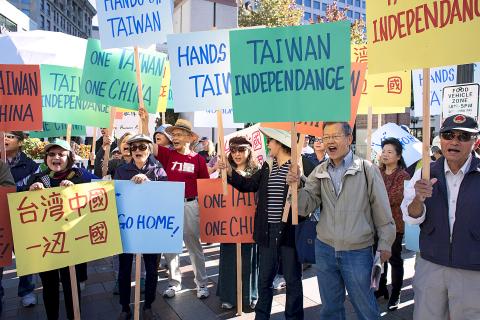US officials are reassuring Taiwan that no matter what Chinese President Xi Jinping (習近平) says about it during his summit with US President Barack Obama this week, Washington will not change its current policies.
“It is normal for a Chinese leader to raise Taiwan,” US Assistant Secretary of State for East Asia and Pacific Affairs Daniel Russel told a media briefing on Tuesday.
“We will always make clear when the issue arises that we place great importance on stability across the [Taiwan] Strait,” he said. “We respect the right of the people on Taiwan to exercise their democratic rights and will continue to counsel restraint on the part of Beijing in order to maintain trust and stability.”

Photo: Reuters
Speaking at the same event, Daniel Kritenbrink, senior director for Asian affairs at the US National Security Council, said that the US respected Taiwan’s democratic process and had a long-standing position on cross-strait issues based on the “one China” policy, the six communiques and the Taiwan Relations Act (TRA).
“Our fundamental interest is in cross-strait stability,” he said.
Russel said that the US had an immensely complex relationship with China, one that was anchored in a commitment to prevent strategic rivalry and to ensure “we are working to reconcile our respective legitimate interests.”
“We are digging down on problem areas. That will be a significant dimension of the summit. We do not paper over our differences with China on important issues,” he said. “We have serious differences over what constitutes acceptable behavior in cyberspace and in maritime space — particularly in the South China Sea.”
He said there were also differences on human rights and the treatment of civil society, as well as financial and regulatory policy. Russel said that the US was not trying to contain China and that US policy was not hostile.
“The same rights that apply to the big and strong apply similarly to the small and weak. Freedom of navigation and freedom of over-flight are not rights that one country grants to another,” he said.
“Strong and important countries like China have to ensure that small neighbors have the ability to exercise those same rights,” he said.
Xi arrived in Seattle on Tuesday and is to meet with Obama at the White House later today and tomorrow.
As Xi arrived, the New York Times said that the US and China had been negotiating what could become the first arms control accord for cyberspace with a goal of announcing an agreement during Xi’s visit.
According to the newspaper, the deal would safeguard critical infrastructure during peacetime, but was not expected to cover contentious issues such as the theft of intellectual property or data.
An article by Bloomberg predicted that Xi’s visit would be overshadowed by China’s growing military assertiveness, its expanding economic espionage and its crackdown on human rights at home.
“We have to be cognizant the level of anxiety, competition and tension in our relationship is here to stay,” former US Department of State official Kurt Campbell was quoted as saying by Bloomberg.

Tropical Storm Gaemi strengthened into a typhoon at 2pm yesterday, and could make landfall in Yilan County tomorrow, the Central Weather Administration (CWA) said yesterday. The agency was scheduled to issue a sea warning at 11:30pm yesterday, and could issue a land warning later today. Gaemi was moving north-northwest at 4kph, carrying maximum sustained winds near its center of up to 118.8kph and gusts of 154.8kph. The circumference is forecast to reach eastern Taiwan tomorrow morning, with the center making landfall in Yilan County later that night before departing from the north coast, CWA weather forecaster Kuan Shin-ping (官欣平) said yesterday. Uncertainty remains and

SEA WARNING LIKELY: The storm, named Gaemi, could become a moderate typhoon on Wednesday or Thursday, with the Taipei City Government preparing for flooding A tropical depression east of the Philippines developed into a tropical storm named Gaemi at 2pm yesterday, and was moving toward eastern Taiwan, the Central Weather Administration (CWA) said. Gaemi could begin to affect Taiwan proper on Tuesday, lasting until Friday, and could develop into a moderate typhoon on Wednesday or Thursday, it said. A sea warning for Gaemi could be issued as early as Tuesday morning, it added. Gaemi, the third tropical storm in the Pacific Ocean this typhoon season, is projected to begin moving northwest today, and be closest to Taiwan on Wednesday or Thursday, the agency said. Today, there would likely

DISRUPTIONS: The high-speed rail is to operate as normal, while several airlines either canceled flights or announced early departures or late arrivals Schools and offices in 15 cities and counties are to be closed today due to Typhoon Gaemi, local governments announced last night. The 15 are: Taipei, New Taipei City, Taoyuan, Tainan, Keelung, Hsinchu and Kaohsiung, as well as Yilan, Hualien, Hsinchu, Miaoli, Chiayi, Pingtung, Penghu and Lienchiang counties. People should brace for torrential rainfall brought by the storm, with its center forecast to make landfall on the east coast between tonight and tomorrow morning, the Central Weather Administration (CWA) said. The agency issued a sea warning for the typhoon at 11:30pm on Monday, followed by a land warning at 11:30am yesterday. As of

CASUALTY: A 70-year-old woman was killed by a falling tree in Kaohsiung as the premier warned all government agencies to remain on high alert for the next 24 hours Schools and offices nationwide are to be closed for a second day today as Typhoon Gaemi crosses over the nation, bringing torrential rain and whipping winds. Gaemi was forecast to make landfall late last night. From Tuesday night, its outer band brought substantial rainfall and strong winds to the nation. As of 6:15pm last night, the typhoon’s center was 20km southeast of Hualien County, Central Weather Administration (CWA) data showed. It was moving at 19kph and had a radius of 250km. As of 3pm yesterday, one woman had died, while 58 people were injured, the Central Emergency Operation Center said. The 70-year-old